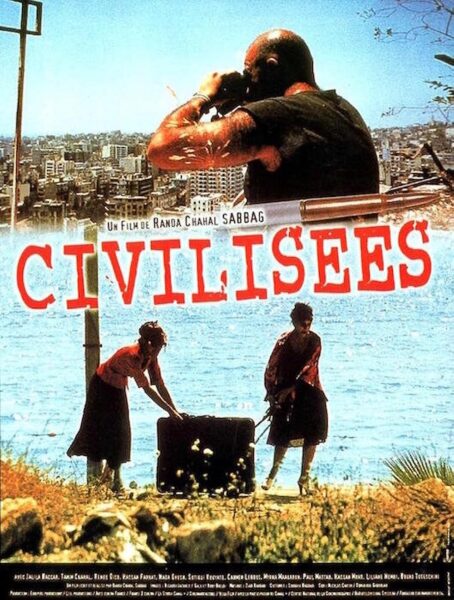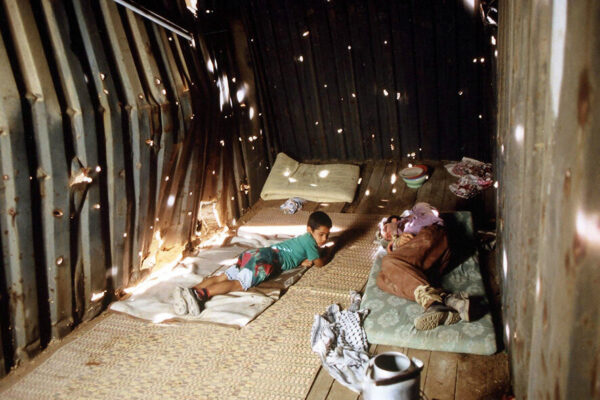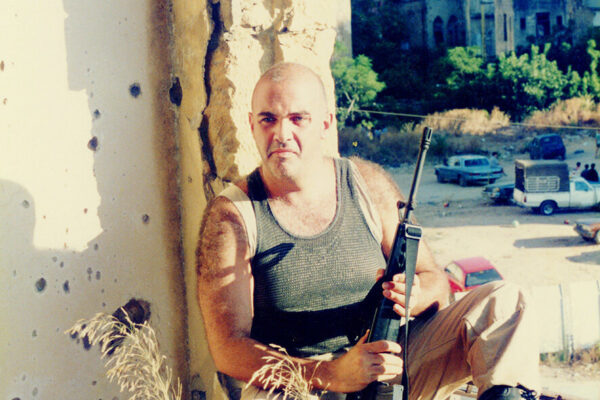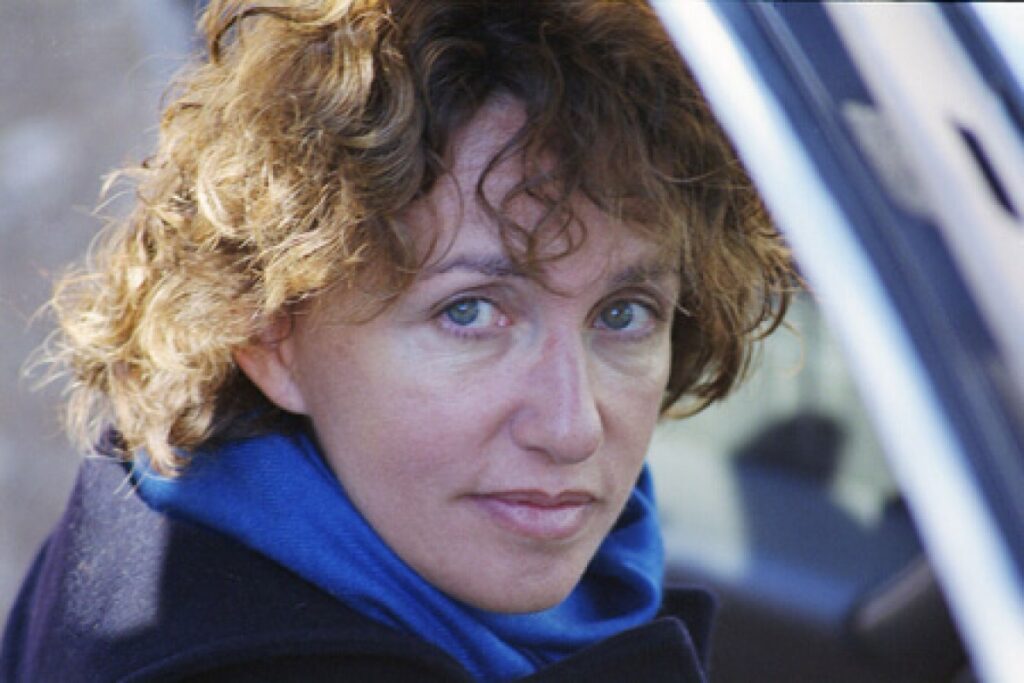Collins dictionary defines ‘Black Humour’ as: A form of humour that regards human suffering as absurd rather than pitiable, or that considers human existence as ironic and pointless but somehow comic. The dictionary might have well defined the cinematic quality and approach of the Lebanese/French filmmaker Randa Chahal Sabbag’s 1999 movie, Civilisées (A Civilized People).
Set in the Civil war period that besieged Lebanon from about 1975 to 1990, the film is about a group of characters holding forth in a residential building of crumbing city, possibly Beirut. The elite owners of the apartment have abandoned the place, escaping the country and the horrors of the war while leaving behind their maid servants – mainly Egyptian, Malaysian, Sri Lankan emigrants – to take care of what is left. Policing this apartment and the area near-by that includes a check post is a maverick sniper who shoots people who are crossing the border line in cold blood but not after letting some complacency creep in by letting the first few to cross. To amuse himself, this self-declared policeman also plays cards with a hardened dead body on which he also does some dental procedures – as if it were alive.
Another desperate character – this one belonging to the Lebanese elite – takes the risk to return back to her apartment so that she can meet her lover. She seems to be waiting forever for a phone call and when it finally comes, she finds herself face down on the floor under the shutter of her half closed door trying to sneak out of her stifling apartment where balconies too are fully covered with sand bags as a first line of defence against flying bullets and grenades. That she insists her maids bring her the phone so that she has the badly needed conversation with her lover in the position that she is in – half inside and half outside – makes the situation ideal for some slapstick comedy. But the civil war being waged outside lifts it into the realm of humour – humour of the dark kind to be precise. The absurdity of the situation insulates her and us from the horrors of the war that is being waged right outside. Or does it accentuate it?

In his book Anthology of Black Humour published in 1939, Andre Breton, otherwise well known as the prominent theorist for surrealism, while dissecting the concept of Black Humour, quotes Sigmund Freud and his psychoanalytical view on humour. One of the characteristics of humour says Freud, is that it has in it a liberating element – “It refuses to be hurt by the arrows of reality or to be compelled to suffer. It insists that it is impervious to wounds dealt by the outside world, in fact, that these are merely occasions for affording it pleasure.” The tramp in Charles Chaplin’s The Gold Rush (1925) refuses to get bogged down by hunger and poverty – he boils and cooks his own shoes and eats it as if it were the tastiest dish ever. What’s more, he goes on to perform a dance like movement using the fork and the shoes. We celebrate this sequence as an impactful comical sequence in the history of cinema. Can we accuse the tramp for escaping the harsh reality of his situation or the audience for taking much pleasure from this escape?
Freud terms this as a “near regressive or reactionary process”, but gives it some dignity when compared to other well defined forms of avoiding the ‘compulsion to suffer’ on account of what reality throws at us – like intoxication, ecstasy, a pre-occupation with the self, and neurosis that would culminate in madness. The dignity in humour lies in the fact that the person refuses to suffer. It is this dignity that differentiates the gag from being just a joke. The conditions that reality throws at the tramp are heightened by this humour which shows him eat his own shoes.
Freud gives his own example of a man being sent to gallows on a Monday morning, who humours himself. “Well, the week’s beginning nicely”, he says as he amuses himself with a sense of satisfaction. This self-amusement could also be an act of defiance against the reality. He is not distressed by and ‘compelled to suffer’ by the ‘traumas of the external world’, such traumas are occasions for him to gain pleasure. Andre Breton echoes these thoughts when he distinguishes ‘Black Humour’ as “a superior revolt of the mind – the triumph of the pleasure principle over the principle of reality.”
Lebanon is a multi-racial and multi-religious country – holding within itself are people from the Druze faith, the Maronite Christian community, the Sunni Muslims, the Shia Muslims, the secular leftists and after the Israel-Palestine conflict, the influx of the Palestinians – not to mention the Syrians, Egyptians, the French and others from the third world. Over a period of fifteen years, infighting amongst these groups at the street level soon turned into a full-fledged civil war, soliciting the invasion of the Israelis – and the United States by default – on one hand and the intervention of the Arab world mainly through Syria on the other. Randa Chahal Sabbag’s father was an Egyptian Muslim and her mother, a Christian. Both had secular communist leanings. The entire family, including her elder sister and brother right from their childhood, were involved in political activism of all kinds which included defending themselves and their neighborhood with weapons. Randa Chachal Sabbag studied cinema in Paris and when the civil war broke out, she came back to Lebanon to start documenting the war.
In 1979 she came up with her first documentary Pas à Pas (Step By Step), which dwells upon the causes of the conflict by showing the chronology of events that led to the disintegration of Lebanon, the intervention of the Israelis and the United States and the change of power equation in the area. In Nos Guerres Inprudentes (Our Heedless War) made in 1995, she turned the camera towards her own family wherein her brother, sister and mother reflect on the struggle that they had to undergo in the armed conflict. The film takes stock of the futility of the war and the characters on their own actions during the war. Randa Chahal Sabbag’s third major documentary ‘, Souha, Survivre a L’enfer (Souha, Surviving Hell), made in 2001, follows Souha, a revolutionary young fighter condemned to the harshest jail in Lebanon for ten long years for trying to assassinate a military commander whose allegiance was towards the Israelis.
In these documentaries and some other short ones that Randa Chachal Sabbag made in her career, she reflects on the harsh realities thrown at her and the people of Lebanon. There is anguish in Step By Step, there is a realisation of the futility of the war in Our Heedless War and in Souha, Surviving Hell, there is the depiction of an uneasy aftermath of defiance. Amidst all these emerges the dark humour of A Civilized People, refusing to get hurt by the reality as it distinguishes the macabre absurdity of it – going beyond the wit, sarcasm, slapstick, light-hearted jokes and even stupidity, all of which this situational comedy has in plenty. ‘Revolt of the mind’ over reality Andre Breton had said. “Humour is not resigned; it is rebellious.”, Freud had reflected.
The elite Lebanese lady who had come back to her apartment goes to meet her lover risking her life but is shown to come back disenchanted. She plans to return back to the comforts of Paris but misses the flight and has to stay put in the apartment with the war raging outside. Of the two Sri Lankan maids, basking in the luxury of the abandoned apartment, one dies. The ‘Sans Frontier’ French doctor, who otherwise barges into situations to save lives even when not called, cannot save her from an illness. The two Egyptian maids staying upstairs are stuck in the apartment because their passports are not renewed by their country. They let go of the numerous cat fights that they have had with the Sri Lankan duo, helping to shove the dead body into a suitcase and risking the war to take it to a safe burial place. The small muslim boy, who stays with the other refugees in the apartment and who installs cardboard play cards betraying his intention to go to school or to the movies for the sniper to see, requests everyone in the local muslim militia to kidnap the French doctor so that they make some ransom money.

Binding all these is the love story of a young christian girl who comes to work as a maid in a mansion that is away from the city and on the hills where war widows reside in plenty. The owners of the mansion have left the country leaving behind a governess who is shocked and has lost her speech because her son was killed in the war. The young girl has to face an extremely bitter driver who has kidnapped two Syrians and held them captive in the basement in retaliation for his son being kidnapped by the muslim militia and a senior grumbling caretaker maid who is now managing the dilapidated house braving the bombings. They might be away from the mad city but not far enough for the mad war. The driver is often seen filling sandbags and putting them on the line of defence against any possible attack.
On a daily basis, the driver takes the sick governess accompanied by the young christian girl to a graveyard where her family is buried – which is often attacked by faceless attackers, the horror and comedy shown only through machine gun and bomb sounds. On the way to the graveyard the car has to pass through a check post manned by muslims. The young christian girl falls in love with a young muslim boy manning the check post, much against the wishes of others in the militia group or of the grumbling senior maid at the mansion. The grumbling senior maid herself has an equally coloured old muslim lover – a fragile naughty non-Lebanese supporting himself with a walking stick – whom she will not marry because of his race; but whose help she takes in freeing the captive Syrians because she is fed up of the extra work that she has to do due to their existence.
The love story of the young christian girl comes to a climax when she escapes from the mansion at night to get united with her lover, much to the anguish of the driver. She spends the night with her lover in the apartment where he lives with the other refugees. The next morning she tries to return back to the mansion to collect her all-important identification card, but to do so, she has to cross a check post that is manned by the christian sniper. In a sequence that is aptly shot using an extreme telephoto lens, the all-knowing christian driver comes up to the sniper, takes his help to kill the girl using the sniper rifle, as she is crossing the border – but not after being chided and accused by the sniper of his passivity. Earlier in the film, the sniper had killed a christian priest who had tried to cross the border, and had immediately asked forgiveness from a photo of Christ that he has pasted in his workplace on top of a dilapidated multi storied building.

Also earlier in the film, the young brother of the head of the local muslim militia group gets kidnapped, tortured and killed, but that does not deter him from inducting into his group the boy who wanted the French doctor to be kidnapped. “There are no children here now.”, says the Muslim Militia leader. Much earlier, he had also gotten uneasy with the young member of his group who fell in love with the christian girl. He had recognised the driver whose son they had kidnapped and probably killed; and chides the young man for not putting a bullet into him to avoid a potential discovery and retaliation. Prior to this in the film – in fact, at the beginning – two young muslim teenagers tie a crude bomb on to a cat and let it loose on an enemy target. Much to their discomfort and humorously, the frightened cat funnily clings on to the boys and the boys get blown by the bomb.
Towards the end, when the elite Lebanese is leaving the apartment, two militants barge in with a cat and try to tie a crude bomb on to it. The two Egyptian maids shoo them away to save the cat but throw it away in horror when they realize that it has only one eye. A car passes by and runs on the cat, after which things in this comic sequence turn back to normal. And right at the end, a few Sri Lankan emigrants are playing cricket in front of a board that declares that gun trotting Lebanese are not allowed. Just then a convoy of vehicles pass by and its occupants shoot the players randomly. No one gets hurt. The players disperse as if nothing has happened but hoping that there would be better times to come.
Sadly, there was just a single screening of this film in Lebanon. Fearing that the fragile peace would be disturbed, the Government of the day wanted to cut 50 minutes of this film – which Randa Chachal Sabbag refused to do. In 1990, there was a peace agreement brokered by the Arab world called the ‘Taif Agreement’, under which representatives of all ethnic and religious groups were to be a part of the government after a general amnesty has been granted to all concerned. In the ministry were men who had once fought violently against each other. Randa Chahal Sabbag had then said in an interview: “It was our war and we should not play the innocent.”
Such is the power of humour, especially of the darker kind – Freud and Breton would agree.


